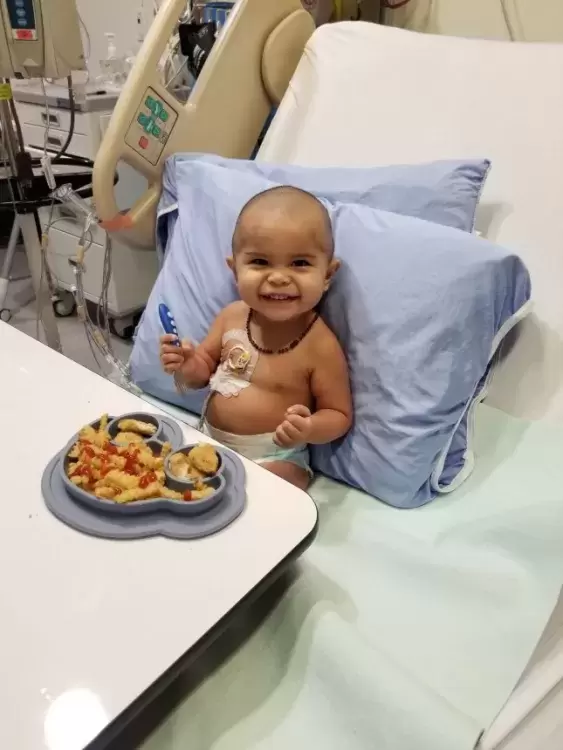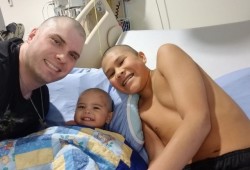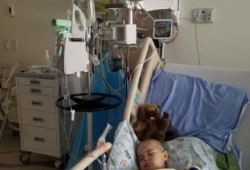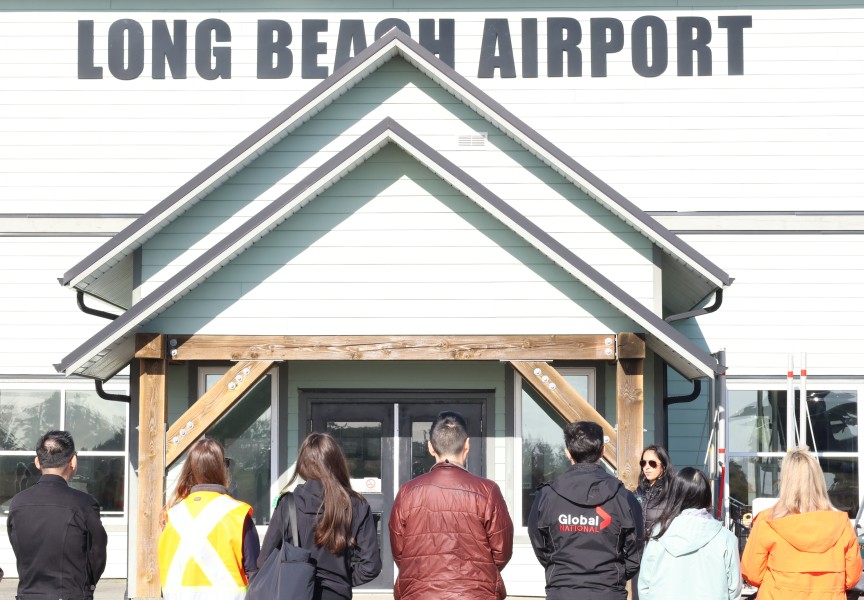Nineteen month-old Andre Winter is a brilliant, happy, smiling toddler adored by his parents and three siblings. But for the past two months Andre had been inexplicably sick for almost the entire time since the New Year began.
Dozens of tests and three hospitals and a frightening diagnosis was made. Baby Andre has AML (Acute Myeloid Leukemia). He has cancer.
His family is rallying around the 19 month old. He is facing six months of intensive treatment, including chemotherapy, in BC Children’s Hospital
Andre’s mother, Anna Dick, is an Ehattesaht member. She said her little boy was fine until after the New Year when he began showing signs of an illness that just never seemed to go away for long.
“He was not himself; he would have fevers off and on and he could barely walk,” said the mother of four. She went on to say that for six weeks he was sick on and off. He would be feverish for a few days, then good for two days only to get sick again.
On Feb. 16 the family doctor performed blood tests and noticed some anomalies that were first treated with iron supplements. Andre was referred to a pediatrician who ordered more blood tests and x-rays. The family was with Andre at the hospital in Campbell River for two days, then sent to Victoria General Hospital for two more days of testing.
Finally, on Feb. 26, Andre was diagnosed with AML (Acute Myeloid Leukemia) at BC Children’s Hospital in Vancouver.
AML is cancer of the blood-making cells that are found in the bone marrow.
Andre is being cared for by a team of oncologists that are part of COG (Children’s Oncology Group), a worldwide childhood cancer research organization.
“Through COG, our oncologists receive information about new treatment plans and improvements to them as soon as they are known,” stated medical notes supplied by Anna Dick.
Nobody knows why children develop AML. According to the Canadian Cancer Society (CCS), “The main treatment for childhood acute myelogenous leukemia (AML) is chemotherapy.”
Andre began chemotherapy on Feb. 28 and is expected to be done his first round on March 10. The CCS says further that an important part of treatment is central nervous system therapy, which is given to prevent or treat the spread of leukemia to the brain or spinal fluid.
Andre had surgery to place a special catheter that will allow medication, including chemo drugs, to be administered in such a way that the medication penetrates the barriers to the spinal fluid and brain.
A stem cell transplant may be done once the disease goes into remission, in which case a suitable donor must be found. Once the first round of chemotherapy is complete the family can only watch, wait and pray for positive results.
“His first round of chemo is ten days and they say he will have intensive chemotherapy,” said Anna. Andre is expected to be in BC Children’s Hospital for six months.
His side effects include loss of his long, wavy baby hair, nausea and fatigue. With his weakened immune system, he cannot afford to be exposed to illness. For that reason, Anna cannot spend time with her son as she battles a cold.
“No sick visitors will be allowed nor anyone whose vaccinations are not up-to-date,” said Anna. “I got a peek at him this morning but I had to scrub down and wear a gown and mask.”
Andre’s father, Andrew Winter, has been staying in the hospital with his son.
In the meantime, Anna and her three other children are staying in a motel with her parents and a brother.
The unexpected health crisis coupled with the length of time the family is required to be in Vancouver has created a heavy financial burden.
Anna says that her First Nation is providing support for one parent, in accordance with patient travel guidelines. This means that they have a hotel room and funds to cover the meals of one adult.
Andrew stays in the hospital with his son and has to buy his food. In addition, pay parking at the hospital costs more than $14 a day. There are three other children to feed and three other family members that are there to help take care of the kids and support Andre.
“We did a $500 shopping trip – all food that can fit into a mini fridge and be made into family meals over a two-burner hotplate and a microwave oven,” said Anna.
The family is on three different waiting lists for family housing applicable to this type of situation.
Anna has launched a crowdfunding page in search of donations for her family. She is asking people wishing to help to visit the page at Fundraiser by Anna Dick : please help my family stay together
Crowdfunding pages take a portion of the donations, so Dick is providing her email address for people wishing to make direct donations. Her email address is annadick16_24@hotmail.com
Baby Andre may need a bone marrow or stem cell transplant down the road, so every member of the immediate family has had their blood tested to see if they are potential candidates. Siblings Robert McLean, 14, Damian Winter, 6 and Alycia Dick, 4, had their blood tested as potential stem cell donors for Andre.
Stem cell donor matches can be hard to find, especially if the patient is Aboriginal.
According to Canadian Blood Services, over 80 diseases and disorders can be treated with a stem cell transplant. There are hundreds of patients in Canada with diseases such a leukemia, lymphoma and aplastic anemia waiting to be matched and, presently, only one in two are matched, says the CBS website.
In 2011, the Assembly of First Nations passed a resolution that encourages Aboriginal people to become stem cell donors by registering with OneMatch Network.
At that time, OneMatch was supporting 14 Aboriginal patients in need of a stem cell transplant.
“Although OneMatch has over 300,000 registrants willing to donate their stem cells to any patient in need, Aboriginal peoples are under-represented and make up only 0.9 percent of the network,” the resolution letter reads.
A patient’s best chance of finding a match are within their own ethnic group.
Andre’s family has a glimmer of hope in the preliminary blood tests. One of the siblings is a potential match but will need more tests to confirm.
In order to join the registry you may call Canadian Blood Services at 1 888 2 DONATE (1-888-236-6283) to have a registration package mailed to your address or visit www.onematch.ca for online registration.
You can also call CBS or visit their website to learn more about what it takes to be a stem cell/bone marrow donor and what methods are used to harvest life-saving stem cells or bone marrow.









